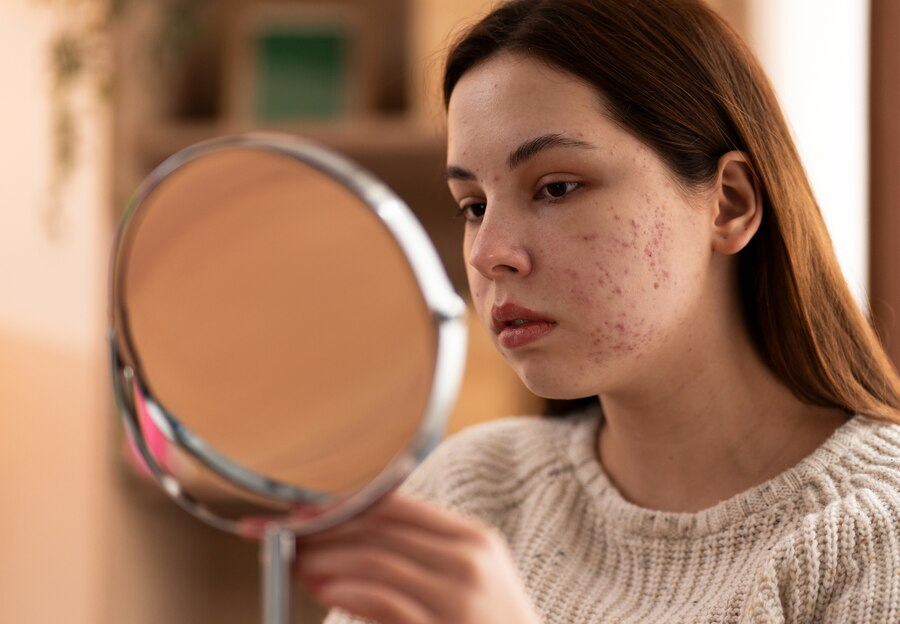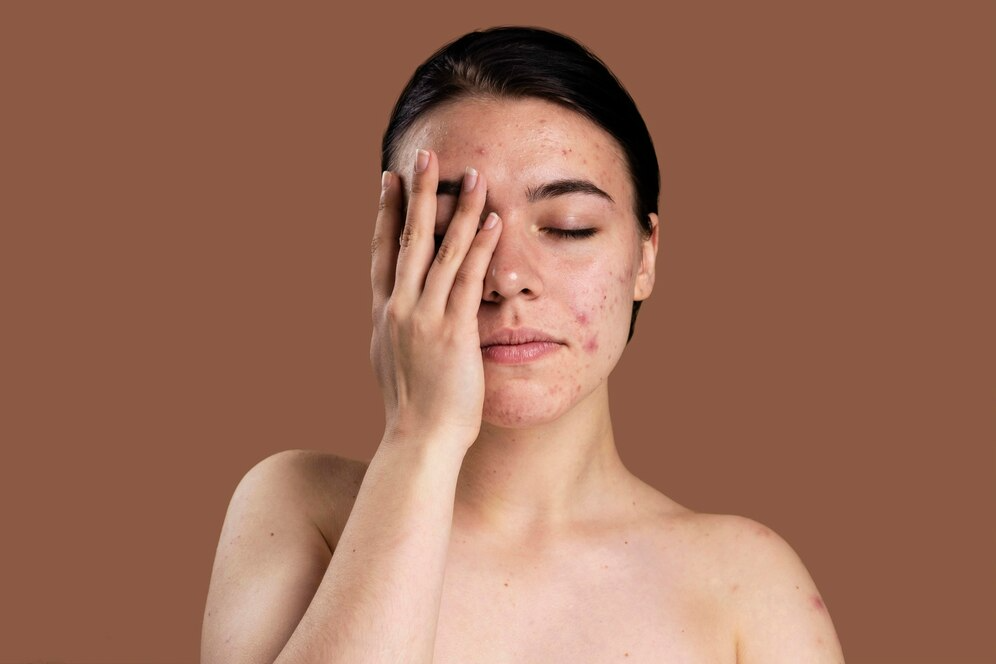What Is Dry Skin Acne? How To Treat It?
Acne is an issue that affects both adults and teenagers. It is usually a skin ailment linked to oily skin. However, the truth is that occasionally, individuals with dry skin might also experience problems and breakouts. Since it’s commonly believed that excessive sebum production causes acne, dry skin acne is a somewhat difficult scenario. Dry skin can also result in blackheads, whiteheads, plugged pores, and acne. There are numerous reasons for this, including grime, bacteria, and a weakened skin barrier, to mention a few. Continue reading to learn what is acne prone skin and see how you may treat acne and get glowing skin.
Table of Contents
What causes dry skin?
Most often, dry skin is the result of an underlying illness, such as dermatitis, which people collectively refer to as eczema. Dry skin will decrease if the necessity is met.
Using a moisturizer is one way that medications for dry skin can help reduce the dryness of the skin. Typically, moisturizer is available as a lotion, oil, or cream. Urea or lactic acid are ingredients in a more essential concentration of moisturizer. These compounds aid in the skin’s ability to retain moisture, yet they also hurt.
Can Dry Skin Cause Acne?
Can dry skin cause acne? This is a question many ask. Even though it is unusual, dry skin acne is not uncommon. Sebum is produced by tiny glands close to the skin’s surface, and too much of it can clog hair follicles. Consequently, this may lead to the appearance of blackheads, whiteheads, and other types of acne.
Ceramide levels may be reduced in your skin if you have dry, acne-prone skin. These are essential in the formation of the skin’s barrier of defense. You can get dry skin acne if your skin barrier isn’t strong enough to keep moisture in and germs like fungus and bacteria out.
Why Does Dry Skin Still Get Acne?
Hair follicles that produce too much oil typically become clogged and inflamed. Bacterial infections are one of the main causes of acne, and this, in turn, leads to them. Thus, although oily skin is thought to be the primary offender, breakouts can also be brought on by dry skin in a number of other ways. These are the following:
- Dry skin can be brought on by genetic causes or aging. In addition to this, dry skin can also result from severe weather, skin disorders including psoriasis, keratosis pilaris, eczema, and inadequate hydration. Your body creates more oil to compensate for the drying out of your skin, which can cause acne.
- Skin that is extremely dry may crack or become flaky and peeling. Such skin has a weaker skin barrier, making it more susceptible to microbial infection. Thus, there are more breakouts as a result.
- When you have dry skin, you tend to go generous on moisturizers, which may worsen your acne. Using moisturizers excessively to keep your skin hydrated can also cause pore blockage, which can result in acne.
- It’s common for people to apply thick moisturizers in the winter and other dry seasons. However, for skin prone to acne, some of these moisturizing ingredients may be overly rich.
Does Dry Skin Make Acne Worse?
Since oily skin is associated with acne, it can be tempting to use astringents and acne treatments until your face feels completely dry. There’s always a chance that irritation could aggravate acne. Astringents, rubbing alcohol, and other products that dry up your skin should be avoided in cases of dry skin acne.
Apply dry skin acne remedies as recommended by a dermatologist. Use a moisturizer designed for skin prone to acne if it feels dry on your skin. After cleansing your face, you should apply the moisturizer twice a day.
How to Prevent and Treat Acne on Dry Skin
- Follow a Regular Skincare Routine: A normal CTM routine is essential for maintaining your skin texture and overall skin health. This also keeps dry skin acne at bay.
- Use a Hydrating Cleanser: A hydrating cleanser not only balances your pH level but also keeps the skin moisturized so that there is no flaky skin.
- Try a Retinol (in Moderation):Retinol works wonders when it comes to unclogging your pores to prevent dry skin acne. You may incorporate retinol into your weekly skincare regime.
- Moisturize: Moisturizing your skin is important to avoid excessive skin dryness. Choose a moisturizer that is non-comedogenic, which means it won’t clog your pores.
- Avoid Over washing: Over washing your face can strip the natural oils from your skin cells which is something you must avoid if you have dry skin.
- Exfoliate gently to clear pores and dead skin: Gentle exfoliation once or twice a week is necessary if you are looking to clear your pores and get rid of dead cell buildups. It will also help improve your skin texture.
- Anti-Acne Treatments: Many people with acne are guilty of popping their pimples, which eventually leads to damaging your skin and leaving behind scars. This is also because people are still unaware of how to dry out a pimple. You should use an anti-acne spot treatment to reduce the breakout size and slowly make it disappear permanently.
FAQ
- Can Acne Treatments Cause Dry Skin?
When you have normal to dry skin, you already lack moisture in your skin, which is further prevented by an acne treatment. This results in skin dryness and, in some cases, dry skin acne.
- Is dry or oily skin more prone to acne?
Oily skin produces more sebum as compared to dry skin. Therefore, there are more chances of clogged pores on oily skin. As clogged pores are the biggest reason for acne or breakouts, oily skin is more prone to acne.
- Does dry skin clog pores?
Although sebum production is minimal in dry skin, it is the dead cells that might clog the pores. So, yes, dry skin can also clog pores.
Conclusion
Although dry, acne-prone skin might be challenging to maintain, acne-free skin can be attained with the correct skincare regimen and behaviors. A mild cleanser, a moisturizer with non-comedogenic chemicals, and an acne-targeting product containing salicylic acid or benzoyl peroxide should all be part of a successful skincare regimen for dry, acne-prone skin.

